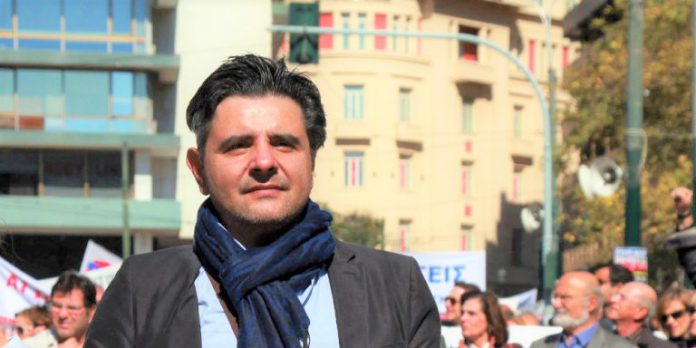The International Press Institute (IPI) today welcomes the long-overdue victory for Greek journalist and IPI member Manolis Kypraios in his legal case against the Hellenic police over the hearing loss he suffered due to a flash grenade thrown at him during his coverage of a protest in 2011.
In December 2022, the Administrative Court of Appeal of Athens rejected the appeal brought by the Greek state and confirmed the verdict siding with Kypraios, finally bringing to a close a nearly 12-year fight for justice.
A lower court had in May 2020 ruled in favour of Kypraios, identified the two perpetrators with the MAT unit of the Hellenic police, awarded compensation to the journalist for the injuries he sustained, but this first-instance verdict was challenged in court.
Despite the recent ruling in his favour, the state has yet to pay the financial compensation awarded to Kypraios by the court, leaving him tens of thousands of euros out of pocket.
Kypraios, an experienced war correspondent who had reported from conflict zones in Kosovo, the Middle East, the Caucasus and Nigeria, was left permanently deaf in both ears after the riot police deliberately threw a flash grenade in his direction from a close distance as he documented an anti-austerity protest with his camera near Syntagma Square in Athens.
As a result of the attack, which occurred despite Kypraios verbally identifying himself as a member of the press and showing his journalistic ID, he had to undergo surgery on his ears twice, was left unable to work and continues to suffer from post-traumatic stress disorder and other health problems.
Kypraios, who is a member of IPI, hailed the ruling as a victory for “democracy, society and freedom of the press”.
IPI Deputy Director Scott Griffen said: “IPI welcomes the long-overdue justice for Manolis Kypraios, who was forced to cut short a career in journalism due to the irresponsible and heavy-handed actions of the Greek riot police. To this day, neither the police force nor the state has ever apologized to Kypraios.
“If the new government Task Force established to stem the erosion of press freedom is looking for a way to rebuild trust between media representatives and law enforcement bodies in Greece, we suggest that ensuring a formal apology is issued to Manolis Kypraios would be a good place to start. In addition, while the outcome in this case is positive, it is manifestly unacceptable that this process took 12 years to complete, and the Greek authorities and courts must take steps to ensure far swifter justice for cases of attacks on journalists.”
Police violence and arbitrary actions towards the press in Greece has continued in recent years, according to monitoring conducted by IPI and published on the Mapping Media Freedom platform.
The majority of these cases involved heavy-handed policing of protests and demonstrations, which occur most often in Athens, and many alerts involve the MAT unit of the Hellenic Police, which is specialized in riot control.
Most recently in January 2023, officers of the MAT physically and verbally assaulted several journalists in the northern city of Thessaloniki as they attempted to report on the dispersion of a protest in support of a convicted anarchist.
In November 2022, police arrested and then filed criminal charges against well-known Greek photojournalist Nikos Pilos after he was detained while he was covering a police operation in Athens.
In October 2022, MAT riot officers violently attacked American photojournalist Ryan Thomas as he was covering a protest against a redevelopment project in Athens and documenting police violence against protesters.
In July 2022, MAT officers verbally harassed and threatened journalist and filmmaker Hibai Arbide Aza at Monastiraki Square in Athens as he was covering a demonstration.
In 2021, 2022 and 2023, the MapMF platform documented 19 press freedom violations in Greece involving police and state security forces, which affected 49 journalists and media workers.
Griffen said these cases demonstrated a lack of awareness and training of the police on how to deal with journalists reporting from protests and called for the government’s new Task Force to establish additional training involving the MAT and Greek journalist unions.
Read more of IPI’s advocacy and reporting on press freedom in Greece here.
This statement IPI is part of the Media Freedom Rapid Response (MFRR), a Europe-wide mechanism which tracks, monitors and responds to violations of press and media freedom in EU Member States, Candidate Countries, and Ukraine. The project is co-funded by the European Commission.

